2021 is a crucial year for Japan to make the right energy and climate policy choices. March marks the 10th year since the Fukushima Daiichi Nuclear Power Plant disaster. In November, COP26 will be held to question strategies for 2030 and 2050 to prevent climate crisis.
At the same time, the Japanese government is reviewing its goals for the 2030 Energy Mix and greenhouse gas reduction target (nationally determined contribution: NDC) as well as its Green Growth Strategy for 2050.
Against this backdrop, Renewable Energy Institute has made a series of policy proposals to suggest Japan's path to a carbon-free society. Even after Prime Minister Suga announced the ambition of reaching carbon neutrality by 2050 in October last year, the national energy policy continues to show adeherence to coal-fired power and nuclear power generation. The Institute's proposal shows that energy transition to a carbon-free society is possible by expansion of renewable energy and improvments in energy efficiency.
We hope that these proposals will contribute in developing Japan's energy policies in the way they should be.
At the same time, the Japanese government is reviewing its goals for the 2030 Energy Mix and greenhouse gas reduction target (nationally determined contribution: NDC) as well as its Green Growth Strategy for 2050.
Against this backdrop, Renewable Energy Institute has made a series of policy proposals to suggest Japan's path to a carbon-free society. Even after Prime Minister Suga announced the ambition of reaching carbon neutrality by 2050 in October last year, the national energy policy continues to show adeherence to coal-fired power and nuclear power generation. The Institute's proposal shows that energy transition to a carbon-free society is possible by expansion of renewable energy and improvments in energy efficiency.
We hope that these proposals will contribute in developing Japan's energy policies in the way they should be.
Proposals towards 2030
-
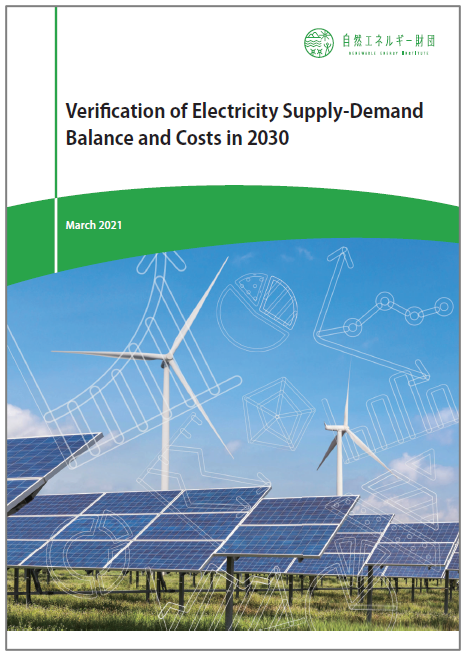
- Report & Proposals
Verification of Electricity Supply-Demand Balance and Costs in 2030
26 March 2021 - In the “Proposal for 2030 Energy Mix in Japan (First Edition)” released in August 2020, Renewable Energy Institute identified two issues requiring further consideration in connection with the sustainable energy mix: stable supply at all hours, and affordable energy supply. This study considers these two issues in detail by conducting analysis using an inter-regional supply-and-demand model.
- Report & Proposals
-
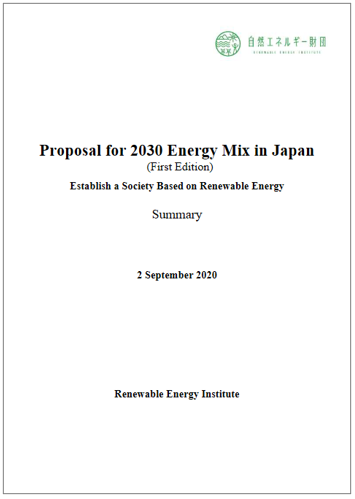
- Report & Proposals
Proposal for 2030 Energy Mix in Japan (First Edition)
Establish a Society Based on Renewable Energy
2 September 2020 (original Japanese released in August 2020) - This proposal shows that it is feasible to achieve a "sustainable electricity generation mix", which is supplied by 45% of renewable energy and not dependent on nuclear nor coal-fired generation by 2030, provided that the appropriate policy measures are taken to realize this energy transition.
- Report & Proposals
Proposals towards 2050
-
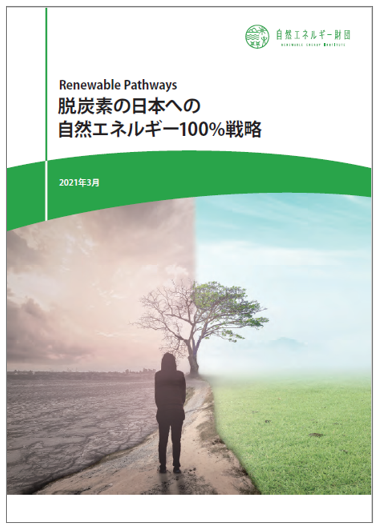
- Report & Proposals
Renewable Pathways: The Strategies to 100% RE for a Carbon-neutral Japan
9 March 2021 (in Japanese) - The report examines renewable pathways to Japan's 2050 decarbonization and suggests the most critical policies that need to be implemented based on an additional analysis made on the REI-Agora-LUT joint study.
Since Prime Minister Suga declared Japan to become carbon-neutral by 2050 last October, discussions for attaining zero-emissions has accelerated. The report responds to the ongoing discussions on targets and policy for 2030 and 2050, as well as discussions on the revision of Japan’s Strategic Energy Plan and Global Warming Countermeasure Plans.
- Report & Proposals
-
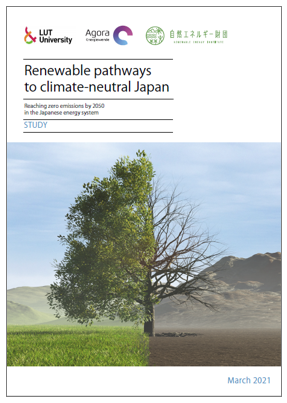
- Joint Study
Renewable Pathways to Climate-neutral Japan
Reaching Zero Emissions by 2050 in the Energy System
9 March 2021 - A joint report by Renewable Energy Institute (REI), Agora Energiewende, and LUT University finds that a zero-carbon energy supply based solely on renewables would be affordable in Japan. The study sets forth a three-step roadmap for renewables deployment and electrification.
- Joint Study
-
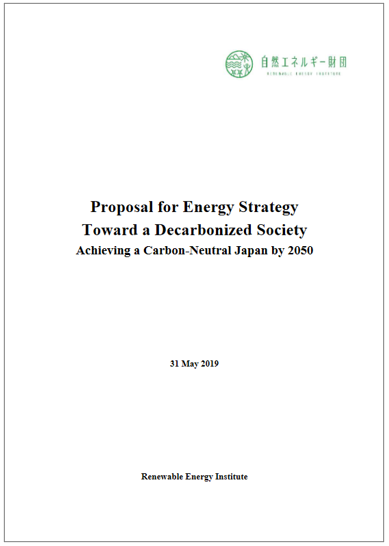
- Report & Proposals
Proposal for Energy Strategy Toward a Decarbonized Society
Achieving a Carbon-Neutral Japan by 2050
31 May 2019 (original Japanese released in April 2019) - The Long-Term Strategy to be formulated by the government should be centered around energy efficiency and renewable energy expansion, in order to enable significant reduction in domestic CO2 emissions through to 2030 and forging a path to zero net emissions by 2050. From this point of view, the proposal raises particularly important issues, together with accompanying data, around the topic of electricity generated from renewable energy, coal-fired power, CCS and hydrogen evaluation, industry, buildings, and traffic measures.
- Report & Proposals






